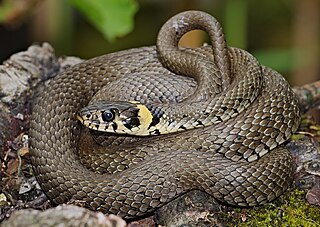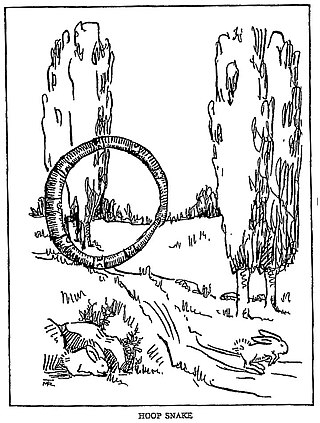
The short-toed snake eagle, also known as the short-toed eagle, is a medium-sized bird of prey in the family Accipitridae, which also includes many other diurnal raptors such as kites, buzzards and harriers. The genus name Circaetus is from the Ancient Greek kirkos, a type of hawk, and aetos, "eagle". The specific gallicus means "of Gallia".

Colubridae is a family of snakes. With 249 genera, it is the largest snake family. The earliest species of the family date back to the Oligocene epoch. Colubrid snakes are found on every continent except Antarctica.

Squamata is the largest order of reptiles, comprising lizards, snakes, and amphisbaenians, which are collectively known as squamates or scaled reptiles. With over 10,900 species, it is also the second-largest order of extant (living) vertebrates, after the perciform fish. Members of the order are distinguished by their skins, which bear horny scales or shields, and must periodically engage in molting. They also possess movable quadrate bones, making possible movement of the upper jaw relative to the neurocranium. This is particularly visible in snakes, which are able to open their mouths very wide to accommodate comparatively large prey. Squamates are the most variably sized living reptiles, ranging from the 16 mm (0.63 in) dwarf gecko to the 6.5 m (21 ft) Reticulated python. The now-extinct mosasaurs reached lengths over 14 m (46 ft).

The grass snake, sometimes called the ringed snake or water snake, is a Eurasian semi-aquatic non-venomous colubrid snake. It is often found near water and feeds almost exclusively on amphibians.

The hoop snake is a legendary creature of the United States, Canada, and Australia. It appears in the Pecos Bill stories; although his description of hoop snakes is the one with which people are most familiar, stories of the creature predate those fictional tales considerably. Several sightings of the hoop snake have been alleged along the Minnesota-Wisconsin border in the St. Croix River valley, Wake County in North Carolina, Prince Edward Island, and Kamloops, British Columbia.

Tiger snakes are a large and highly venomous snake of southern Australia, including its coastal islands and Tasmania. These snakes are often observed and locally well known by their banding, black and yellow like a tiger, although the species can be highly variable in coloration and patterning. All populations are classified within the genus Notechis (Elapidae). Their diverse characteristics have been classified either as distinct species or by subspecies and regional variation.

Günther's black snake is a species of poorly known lamprophiid snake endemic to central Africa. It is the only member of the genus, Bothrolycus. This snake is notable as one of the few snakes with notable sexual dimorphism, as well as possessing a small pit anterior to the eye. While superficially similar to the thermal pits of vipers, its function remains unknown.

The Chinese cobra, also called the Taiwan cobra, is a species of cobra in the family Elapidae, found mostly in southern China and a couple of neighboring nations and islands. It is one of the most prevalent venomous snakes in China and Taiwan, which has caused many snakebite incidents to humans.
Epictia ater, or black blind snake, is a species of snake in the family Leptotyphlopidae.
Gerrhopilus ater, also known as the black blind snake, is a species of snake in the Gerrhopilidae family.

The Calamariinae are a subfamily of colubrid snakes, commonly known as reed snakes, that are found in southern and southeastern Asia. They are most diverse in Indonesia, especially Sumatra and Borneo. The subfamily contains 90 species in seven genera. Very few specimens of most species have been collected.

Robert Frederick Inger was an American herpetologist. During his lifetime, he wrote numerous books and publications about herpetology. He was also the curator for amphibians and reptiles at the Field Museum in Chicago, Illinois.

Pseudorabdion is a genus of snakes of the family Colubridae.

Pseudorabdion mcnamarae, McNamara's burrowing snake, is a species of snake in the family Colubridae. The species is endemic to the Philippines.

Achalinus ater, commonly known as Bourret's odd-scaled snake, is a species of snake in the family Xenodermatidae.
Polemon ater, also known commonly as the black snake-eater, is a species of rear-fanged venomous snake in the subfamily Aparallactinae of the family Atractaspididae. The species is native to central Africa.
Pseudorabdion albonuchalis is a species of snake in the family Colubridae. It is endemic to Borneo and occurs in Sabah and Sarawak (Malaysia), Kalimantan (Indonesia), and Brunei. It is also known as the white-collared reed snake.
Pseudorabdion collaris, Mocquard's reed snake or common collared snake, is a species of snake in the family Colubridae. The species is found in Indonesia, Malaysia, and Brunei.
Pseudorabdion eiselti, Eiselt's dwarf reed snake, is a species of snake in the family Colubridae. The species is found in Indonesia.












